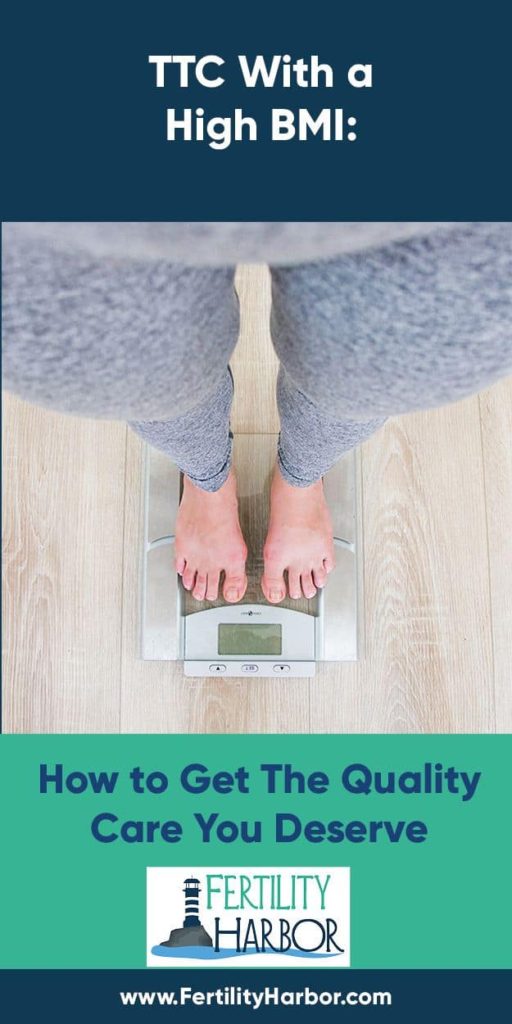This post was reviewed for medical accuracy by Rosalie Gunson, a Certified Registered Nurse Practitioner specializing in fertility care.
When Emily Feeney went to her IVF consult, the RE looked at her weight (255 lbs) and said, “You don’t look like you weigh that much. You’ll need to get to a BMI of 39. Call us when you’ve lost the weight.”
Emily was upset and angry. “That was it,” she says. “No offer of a dietician consult, no recommendations for how to lose the weight in a healthy way. Just ‘go lose weight and call us when you do.’”
Emily ended up getting pregnant on her own, but her story is not unique. Lots of women whose BMI is in the overweight or obese range have trouble getting medical providers to look past the number on the scale and take their individual health history into account.
What does BMI measure?
First of all, let’s be clear about what BMI is. BMI (Body Mass Index) is calculated by dividing your weight in kilograms by the square of your height.
BMI under 18.5: Underweight
18.5 to 24.9: Healthy weight
25 to 29.9: Overweight
30 to 39.9: Obese
40 or over: Severely obese
That means if you are 5’9”, the healthy weight range is 125-168 lbs.
If you’re 5’9” and reading this thinking, “WHAT?! At 125 lbs I’d look like I had an eating disorder!” it’s because the calculation doesn’t take into account other factors like build, body composition, or physical fitness. Plenty of famous athletes are technically obese if you look solely at their BMI.

Going by BMI alone, this woman may well be considered overweight!
One indication that BMI isn’t intended to measure body fat is that there’s only one scale for men and women. Women tend to have more body fat than men with the same BMI — that’s just how we’re built.
So if BMI is not measuring body fat, what’s the point of it?
BMI a fast and easy screening tool for medical providers. It doesn’t require any special equipment, since doctors typically measure your height and weight anyway. Because it’s standardized, it’s useful for tracking trends across large populations.
Here’s the problem: BMI is often used as proxy for fatness, and fat patients tend to get less-than-stellar treatment from the medical community.
Whatever your BMI is, you deserve high-quality, evidence-based care from a provider who respects you!
Isn’t losing weight a good way to increase fertility?
You’ve probably heard that losing weight — even as little as 5% of your body weight — can improve fertility.
Yes, that can be true for some women. Excess body fat can affect the hormones needed to ovulate and conceive. Absent other factors, a woman who isn’t ovulating regularly may be able to re-establish her cycles just by losing weight.
Statistically, obese women are also more likely to be poor responders to fertility treatment. They may need higher doses of stimulation drugs, or they may have issues with egg quality.
And once they do get pregnant, they are at a higher risk for various complications, including gestational diabetes and high blood pressure.
Having said that, though, a high BMI is not a guarantee that you’ll experience these complications — and a low BMI doesn’t guarantee that you won’t. You can be overweight with normal blood pressure and blood sugar levels.
Emily is an OB nurse, so she’s seen this firsthand. “I know so many healthy fat people and really unhealthy thin people,” she says. “I’ve taken care of women who were 140 lbs at 40 weeks pregnant and they had gestational diabetes and preeclampsia, and I’ve taken care of women who were over 300 lbs but had uncomplicated pregnancies.”
“At the end of the day, the number just doesn’t tell us where a person is at health-wise,” she says. “I think it’s a good measure of risk, but that alone should not be the only deciding factor when it comes to developing an individualized plan of care. And that’s what we so desperately need: individualized care that meets the needs of the whole person.”
Assumptions about fertility and weight can go the other way, too — some women who are not overweight are told that they can’t be infertile because they’re not fat! Ugh.
Side note: A high BMI can affect men’s fertility, too. Having a BMI over 30 increases the chance of low testosterone. In addition, men with a waist size over 40 inches are more likely to have erectile dysfunction, which is obviously a fertility issue as well.
Why do some fertility clinics have BMI restrictions for IVF?
Many fertility clinics have a BMI cut-off point for treatment. For example, you may be told that your BMI needs to be under 40 to move forward with IVF. That’s 248 lbs for someone who’s 5’6”. Shady Grove Fertility’s current cut-off is 45.
The most common reason has to do with the egg retrieval process, which is done under anesthesia. The concern is that a larger woman may have trouble keeping the airway clear under anesthesia. She may be more likely to have sleep apnea, asthma, or other breathing issues.
But Emily calls bullshit on this excuse. “BMI has been shown to not be a great predictor of poor airway management intra-operatively, but is still being used, I feel like, to fat shame heavy people (read: women) during ‘elective’ procedures,” she says.
“There was no offer to perform an assessment to determine my airway: a sleep study, a sleep apnea questionnaire that you can find online, a physical assessment of my oral cavity. Nothing.”
“My question is: if I weighed 130 lbs but have sleep apnea, how would they have managed that? Because sleep apnea is not exclusive to fat folks.”
That’s a really good question, and one she didn’t get an answer to.
Why do some fertility clinics have BMI restrictions for IUI?
BMI restrictions aren’t just for IVF — some fertility clinics also have them for IUI.
Their reasoning is often that IUIs are more likely to lead to a multiples pregnancy, which is considered a high-risk pregnancy even if everything goes perfectly. They would rather not have obese patients getting pregnant with twins or triplets.
For more information, check out my posts Will Clomid Make You Have Twins?, How Much Does an IUI Cost Without Insurance? and When to Consider Moving on to Injectable Fertility Meds.
OK, so what are you supposed to do if you have a high BMI and you’re looking for fertility treatment? Here are a few tips.
Getting Fertility Treatment With a High BMI
1. Find medical professionals who see beyond the number on the scale.
Studies show that women with high BMIs are not taken seriously when they seek medical treatment. Too often, they are basically told that losing weight will fix whatever their problem is.
That leads to medical conditions not being diagnosed in a timely way. It also makes women more reluctant to go back to the doctor — and who can blame them?
The first time I saw an OB about my wonky cycles (90 days and counting since I’d had a period), I was basically told I was not ovulating because I was fat. I am 5’6”, was probably 160-165 lbs at the time, and did Crossfit. Give me a break!
Needless to say, I took the prescription for Provera and never went back to that doctor. (I have a whole post on Provera here.)
But I still remember how it felt to be dismissed like that, with no exam or blood tests or anything. It is really important to find an ob/gyn who doesn’t jump to conclusions based on your weight.
How will you know if you’ve found a size-friendly provider?
- They are actually interested in you as a person, including your unique medical history. They don’t make blanket assumptions about your lifestyle or your health based on your weight alone.
- They’ll have waiting room chairs, hospital gowns, and blood pressure cuffs that can accommodate larger bodies with dignity.
- They have helped many other overweight or obese women achieve successful pregnancies.
- If you tell them they’ve made you uncomfortable, they do better next time. Which brings me to the next point:
2. Advocate for yourself if you feel you are not being respected — even if it’s awkward.
This is something that Emily wishes she had done.
“Unfortunately I didn’t find another doctor and was not a great advocate for myself. It’s honestly one of my biggest regrets,” she says. “If I were in this situation again, I’d be completely honest about how she was making me feel and what I needed from her. Broaching the topic of weight is so nuanced. It’s awkward for the provider and panic inducing for the patient.”
If that doesn’t work, be willing to change providers. That may be easier said than done, though, if your area only has one fertility clinic.
3. Whatever you do, don’t crash diet to qualify for IVF!
When that biological clock is ticking and you’re told you weigh too much for IVF, a sustainable weight loss effort feels like it’s going to take forever. Extreme diets may start to seem appealing.
Losing too much weight too fast isn’t good for your health or your chances of conceiving, especially if it involves taking shady weight-loss pills or trying to live on 1200 calories a day.
Your body doesn’t want to be pregnant in a famine! You need to provide your body with proper nutrition so it senses this is a safe time to reproduce.
In addition, lots of women have underlying medical conditions that make it hard to lose weight no matter how much they work out or how many kale smoothies they drink.
If you have PCOS, a thyroid issue, or a vitamin deficiency, being told to exercise more and eat less is not helpful! You need to work with a provider who understands how to treat these conditions so your metabolism is working properly.
Emily has PCOS and ended up losing some weight by doing the keto diet… Not that her providers took much interest. “They didn’t ask me at all how I lost the weight,” she says. “I’m curious if I told them that I threw up everything I ate, if they’d even care?”
How sad is that?!
4. Keep in mind that being underweight isn’t good for your fertility, either — it just gets less attention.
Our culture being the way it is, a fat woman is more likely to encounter pushback from the medical community than a very thin woman is. But the truth is that being too thin can be a big fertility challenge.
It’s not too surprising that underweight women (defined as a BMI under 18.5) have a higher risk of preterm delivery and having babies with low birth weights.
But it’s also harder for them to get pregnant to begin with. Women’s bodies need a certain amount of body fat to produce the hormones needed for pregnancy. In fact, fat cells make estrogen!
Some hardcore fitness junkies end up dieting and/ or exercising to the point that they no longer get a period (hypothalamic amenorrhea). Someone in that situation doesn’t need IVF — she needs to eat more calories, GAIN weight, and restore her cycles.
Getting Prenatal Care with a High BMI
Unfortunately, once you finally get your BFP, these issues do not go away. Here are just a few ways in which your size may affect the quality of care you receive during your pregnancy:
- You may get mixed messages about how much weight you should gain over the course of your pregnancy.“I was told at my first prenatal appointment that they only wanted me to gain 11-20 lbs during the whole pregnancy,” says Emily. “I’ll admit that I was really stressed about my weight nearly my whole pregnancy. And they certainly don’t want you to diet while pregnant. It felt like, ‘We don’t want you to worry about your weight, but don’t gain too much weight.’”
- Your doctor may exaggerate how risky a plus-size pregnancy actually is. Be sure to ask for the data behind these comments. Even if the risk of a particular complication doubles from 5% to 10%, a 10% chance is pretty low! They shouldn’t make it seem as though every overweight woman who gets pregnant is going to have major issues when that is far from true.
- Some doctors may try to pressure you into having a c-section based on your size alone. If having a vaginal, low-intervention birth is important to you, advocate for yourself and make that clear. Ask for specific reasons that a c-section would be necessary in your case.
- Think about ways to make the delivery more comfortable for you. For example, you may want to look for hospitals or birthing centers that offer the option of laboring in water. Consider enlisting a doula who can help support your choices during labor.More info about the transition to prenatal care can be found in the post Graduating from an RE to an OB for Prenatal Care.
As always, I wish you luck and baby dust!
Resources for Further Reading:
plussizebirth.com
Why BMI is a Big Fat Scam, from Mother Jones
This post was last updated in March 2025. Most of its content was written in 2020.




 I’m Jenn! Here I am with my beautiful twin boys. My pregnancy was possible thanks to fertility treatment for PCOS.
I’m Jenn! Here I am with my beautiful twin boys. My pregnancy was possible thanks to fertility treatment for PCOS.


